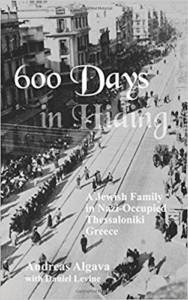 Title: 600 Days in Hiding: A Jewish Family in Nazi-Occupied Thessaloniki, Greece
Title: 600 Days in Hiding: A Jewish Family in Nazi-Occupied Thessaloniki, Greece
Author: Andreas Algava and Daniel Levine
Publisher: For Passion Publishing
ISBN: 9781983462542
Pages: 424
Genre: Non-Fiction / Memoir
Reviewed by: John Murray
Pacific Book Review Star
Awarded to Books of Excellent Merit

During World War II, the Italian Army invaded Greece. Greece successfully repelled the Italians but brought the attention of Nazi Germany. Roughly six months later, Germany occupied Greece until near the end of the war. The battle left Greece devastated and all but wiped out the Jewish population. One of a few Jewish families managed to survive, mainly thanks to the sympathetic Greek neighbors, and this is their story.
Andreas Algava was only a year old when the Nazis occupied Greece. The family was torn between leaving for Poland or risk staying behind as both choices seemed poor in the face of the Nazi forces’ ruthless determination to exterminate the Jewish population. Algava collected his family’s history and compiled it into a compelling narrative about surviving the Greek Holocaust in World War II.
Much of the narrative unfolds plainly, like a slightly dramatized version of journals or word-of-mouth stories. A series of contextual paragraphs fill in background details like current events and outside perspectives. Between the memoirs and historical information, Algava unspools his family’s story in an engaging manner.
This is very much a family and school friendly book. Algava doesn’t censor events and allows actions and behaviors to speak for themselves. Scenes such as his father’s arrest for selling goods at low prices when threatened build up tension. A pair of German officers force Algava’s father to undersell items and then accuse him of war profiteering only to charge him basically a get-out-of-jail card. That and other scenes seem tailored towards study groups and discussions.
Extra sections such as his daughters’ introduction, selected family stories in the epilogue, a series of sections of relevant historical context, and a selection of personal photos cement Algava’s message. As he states himself, Algava’s purpose in penning this memoir is to unite the world in as much peace, forgiveness, and make a difference.
As a memoir and non-fiction, it’s difficult to critique other elements of the story. Algava wrote this book to further his message. The writing is polished and complemented with historical context. As such, it’s a fantastic memoir that should appeal to fans of historical narratives and potentially important pieces of writing.
600 Days of Hiding tells the story of survival with a focus on family, community, and the resilience of human relationships. Algava writes wonderfully and allows the story to speak for itself but provides ample material to bolster his message. A message of improving the world and Algava seeks to do just that—one book at a time.


Follow Us